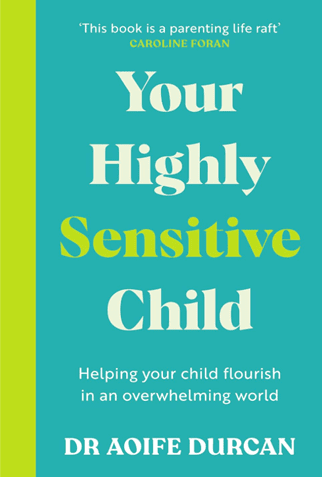
Book Review: Your Highly Sensitive Child – Dr Aoife Durcan
Ideas for Sporting Parents
Sport can be an emotional rollercoaster for children, the thrill of scoring, the sting of missing, the pressure of being watched. Some youngsters however seem to experience all of this more intensely. They might cry after a mistake, withdraw after criticism, or struggle before a big game.
In Your Highly Sensitive Child, Aoife Durcan offers a compassionate roadmap for parents of children who feel deeply and react strongly to their environment. As a sport psychologist working with families and athletes, I see these patterns daily.
Many parents worry that their child is “too emotional” or “not mentally tough enough.” Aoife’s message reframes that thinking: sensitivity isn’t a flaw, it’s a different kind of strength.
Understanding Sensitivity in Young Athletes
She explains that roughly 15–20% of children are highly sensitive. These children process information and emotion more deeply, notice subtle cues others miss, and often show remarkable empathy and awareness.
In sport, that might look like:
- Picking up on a coach’s frustration
- Feeling anxious in loud, competitive environments
- Caring deeply about teammates’ reactions
- Thinking about a mistake long after the game ends
Sensitivity = Depth, Not Weakness
Aoife makes a crucial point: sensitivity isn’t fragility, it’s simply intensity.
Sensitive children experience the world vividly. Without understanding and guidance, that intensity can turn inward, creating anxiety or self-criticism. But with support, it becomes a foundation for focus, empathy, and strong self-awareness the same qualities elite athletes often rely on.
>> 9 Tips for Children from Olympians
How Sensitivity Shows Up in Sport
Her descriptions align closely with what we see in sport psychology work. Sensitive children who play sport often:
- Feel emotions deeply crying after losses or mistakes.
- Overthink performances or worry about letting others down.
- Struggle with pressure when they sense expectations.
- Notice everything changes in tone, noise, or teammates’ moods.
- Show strong empathy and are often team players who care deeply.
Recognising these traits allows parents to move from frustration (“Why can’t they toughen up?”) to understanding (“What’s their sensitivity trying to tell me?”).
Parental Support: From Pressure to Partnership
One of Aoife’s main lessons is that sensitive children thrive when parents move from pressure to partnership.
In sport, many parents and coaches worry that being too understanding will make their child “soft.” The opposite is true. Emotional validation builds self-regulation and confidence.
Here’s how Aoife’s principles translate to sport:
- Validate, Don’t Dismiss
If your child feels upset after losing:
“I can see that really hurt you care so much about doing well.”
This recognition soothes their nervous system, helping them process disappointment constructively.
- Teach Emotional Language
Encourage your child to name emotions such as frustration, nervousness or excitement.
Naming feelings makes them manageable. It’s a mental skill that supports emotional control in pressure moments.
>> Helping Young Athletes Manage Emotions
- Encourage Recovery, Not Rumination
Sensitive children or teenagers tend to replay mistakes.
Teach short reset routines deep breaths, 3 second time-outs, or repeating a cue like next play.
This develops mental recovery skills essential for performance consistency.
- Create Calm Before Competition
Routine creates security. Establish a consistent pre-game structure quiet time, favourite music, phone or Ipad time (yeah that’s right!) or a light warm-up to prevent overstimulation before matches.
- Redefine Mental Toughness
Aoife’s approach supports a more modern definition:
Mental toughness isn’t about ignoring emotion, it’s about managing it well.
Highly sensitive children can be incredibly resilient when their feelings are channelled into focus and learning.
>> How to Develop Mental Toughness in Young Athletes
Coaches and the Sporting Environment
She urges adults to consider the child’s surroundings.
In sport, that means understanding how coaching styles impact sensitive athletes. Loud, critical, or unpredictable coaching can easily overwhelm them.
What Parents Can Do
- Speak with coaches privately about your child’s needs.
- Encourage feedback delivered calmly or one-on-one.
- Choose environments that value well-being and learning as much as winning.
A well-supported sensitive child may not be the loudest or most confident on the team, but often they are the most thoughtful, focused, and self-motivated when given space to thrive.
From Sensitivity to Strength
Her key message is empowering: sensitivity, when nurtured, becomes a form of quiet strength.
These children grow into adults who are emotionally intelligent, self-aware, and compassionate exactly the type of athletes who lead with integrity.
In my work with young athletes, I’ve seen sensitivity evolve into resilience.
When children learn to view their emotions as information rather than weakness, they become mentally stronger and more self-directed.
Emotions as Performance Tools
- Fear → shows the challenge matters
- Frustration → signals motivation to improve
- Sadness → reflects deep passion for the sport
Helping your child understand these signals builds true mental toughness the ability to feel deeply and still move forward positively.
Practical Takeaways for Parents
To bring Aoife’s ideas into everyday sport life:
- Notice triggers when and where your child feels overwhelmed.
- Regulate yourself first your calm presence helps them remain calm.
- Model recovery after mistakes, show composure and perspective.
- Build emotional routines breathing, journaling, reflection after games.
- Celebrate sensitivity it’s awareness, empathy, and insight and most definitely not a weakness.
Conclusion
Aoife Durcan’s Your Highly Sensitive Child is a must-read for parents of young athletes who feel things deeply. It reminds us that emotions in sport and life aren’t the enemy they’re a vital part of learning, motivation, and growth.
When parents embrace sensitivity as a strength, they help their children develop the emotional tools to perform with freedom, confidence, and resilience.
The message is simple yet transformative: Sensitivity and mental toughness aren’t opposites they’re partners in helping your child go on to thrive.
You can also join our online community – THE SPORTS PSYCHOLOGY HUB – for regular Sports Psychology tips, podcasts, motivation and support.

Best Wishes
David Charlton
Global Sports Psychologist who is located near Newcastle Upon Tyne, UK and willing to travel Internationally. David also uses online video conferencing software (Zoom, Facetime, WhatsApp) on a regular basis and has clients who he has supported in the UK, UAE, Saudi Arabia, Australia and New Zealand.
Managing Director – Inspiring Sporting Excellence and Founder of The Sports Psychology Hub. With over 15 years experience supporting athletes, coaches, parents and teams to achieve their goals, quickly.






